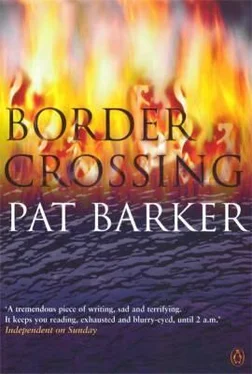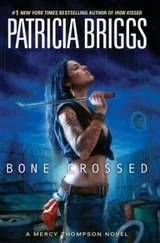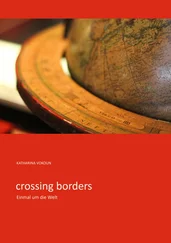Jeff threw the first stone. Tom was sure about that. Almost sure. Little stones, pebbles, plopping into the water around the screaming child, who backed further out towards the centre of the pond. Why did they do it? Because they were frightened, because they shouldn’t have been there at all, because they knew they were going to get into trouble, because they hated him, because he was a problem they couldn’t solve, because neither could be the first to back down. Bigger clods of earth landed in the pond, not too close, they weren’t trying to hit him yet. The frogs submerged and did not reappear. The geese retreated, honking and swaying, as they made their way up the hill.
And then a bus came past. A man, glancing up from his paper, peered through the window, hardly able to credit what he saw, and immediately jumped up and rang the bell. The driver, who could have decided to be awkward, stopped the bus, and minutes later the man — Tom never knew his name — careered down the bank, waded into the pond up to his knees, and gathered Neil into his arms. He carried him all the way home, having got the address out of a subdued and frightened Jeff. They followed him, stomping along behind, too shocked to speak, leaving the jam jars marooned in muddy footprints by the side of the pond.
Three children were saved that day. A man glances up from his newspaper, sees what’s going on, acts on what he sees. Accident. A more interesting news story, a thicker coat of dirt on the bus window, a disinclination to intervene, and it might have ended differently.
In tragedy, perhaps. It might have. He didn’t know. It was his good fortune not to know.
Had he known at the time that what he was doing was wrong? Yes, undoubtedly. His parents had been easy, tolerant, in many ways, but in all essential matters the moral teaching had been firm and clear. Cruelty to animals, deliberate unkindness, bullying smaller children: these were major crimes. What interested him was how little sense of responsibility he felt now. If somebody had asked him about that afternoon, he’d have said something like, ‘Kids can be very cruel.’ Not, ‘I was very cruel.’ ‘Kids can be very cruel.’ He knew he’d done it, he remembered it clearly, he’d known then, and accepted now, that it was wrong, but the sense of moral responsibility was missing. In spite of the connecting thread of memory, the person who’d done that was not sufficiently like his present self for him to feel guilt.
It was something to be borne in mind, he thought, strolling back to his car, in talking to Danny.
He was watching the Channel 4 news when the doorbell rang. Looking through the peephole, he saw Danny, trapped in the distorting glass, like a fish in a bowl. ‘Hello, you’re early,’ Tom said, holding the door open.
Danny stepped across the threshold, his shadow, thrown by the porch light, leaping ahead of him as if it already knew the way. ‘I didn’t know how long it would take.’
‘Never mind. Come in.’
Tom took Danny’s coat and hung it up.
‘Can I get you a drink?’
‘What are you having?’
‘Whisky.’
‘That’ll do fine.’
Tom was remembering the other room, the one in which they’d first met. The shock of seeing the small boy walk in beside the warder. Now he was experiencing a similar shock. Danny’s height, the depth of his voice, the hunched power of his shoulders, the stillness — all these perfectly ordinary characteristics seemed bizarre, so powerfully did Tom sense the presence of that child, immured inside the man.
What was back, without effort, without his wanting it even, was the intimacy of that first meeting.
‘Well, how have you been?’ he asked, settling into an armchair.
‘Since I left hospital? Tired. I went to bed and slept for ten hours. Woke up, didn’t know where I was.’
Not an easy situation, this, Tom thought. You could hardly pretend it was a social call, and yet it wasn’t a consultation either. He was going to have to feel his way forward. ‘Do you want to talk about it?’
A shrug, bringing memories of their first meeting flooding back. ‘Don’t mind.’
‘Quite a decision at your age. How old are you?’ ‘
You know how old I am.’ A pause. ‘Twenty-three.’
‘So what went wrong? After you came out?’
A faint smile. ‘I met a girl. I was living with a Quaker couple at the time, and they’re very nice but also quite elderly and a bit strait-laced, and I decided I’d rather live with the girl. It wasn’t a great big thing.’ He dropped his voice into the bass register. ‘We are now committing ourselves to each other. We were students, students live together. But Mike — the probation officer I had then — told me I had to tell her, and if I didn’t tell her, he’d tell her. So of course I broke it off. I didn’t dare risk it.’
‘Did she mean a lot to you?’
Danny pursed his lips. ‘Dunno. She was nice. Is nice. I don’t suppose it was… You know, some of it was just me proving I could do it with a girl. I mean the bulk of my experience… Uh, the bulk, he says. 99.9 per cent of my experience has been the other sort.’ A gulp of whisky. ‘Not all of it voluntary. It’s the one thing —’
‘No, go on.’
‘I was going to say it’s the one thing I’m bitter about, but then I’ve got no right to be bitter about anything. Have I?’
In the courtroom, Tom had seen Danny smile at his social worker, and thought, Don’t smile. Don’t laugh, don’t look pleased or excited, don’t fidget, don’t scratch your bum, don’t pick your nose, or wriggle, or do any of the things kids do all the time. Not now, not ever. ‘If that’s what you feel…’
‘Yeah, well, okay, I feel bitter. I think they should just come right out with it, you know? “I sentence you to be raped. By some big ugly bastard who’s built like a brick shithouse, uses his arm as a pincushion, and isn’t wearing a condom.”’
‘You don’t mean, you’re —’
‘Oh no. Got lucky there. I’m just naturally slim.’
Danny crossed his legs at the ankle, a conscious display that made Tom want to smile. Wasted on me, son, he thought. Though he could see it wouldn’t be wasted on everybody.
Rape was too intimate a revelation for the first ten minutes of a meeting. Either Danny had no sense of normal social distance and pacing (and where would Danny have acquired that?) or he too had a sense of falling through a trapdoor in the present, into the closeness of their first meeting. Tom kept using words like ‘intimacy’ and ‘closeness’ to describe the atmosphere of that meeting, but there’d also been massive antagonism. As there was now. And yet Danny had trusted him then, he thought, looking into the adult Danny’s amused and trustless eyes. ‘Anyway, the relationship broke up?’ he said.
‘Yes. And then I was told I couldn’t teach.’
‘Why not?’
‘Not allowed to work with children. Actually, not allowed to work with people.’
Tom said gently, ‘But you can see the point, can’t you? I mean if you were a parent and you found out your child’s teacher had been convicted of murder, how would you feel?’
‘I hope I’d think it was a long time ago.’
‘Would you?’
A silent struggle. ‘No, probably not. But it threw me, you see, because I’m just starting the third year — [did three years of an Open University degree, inside, when I was in prison, and you can transfer the credits — and I thought teaching was what I’m going to do, and now I don’t know what I’m going to do. And, you know, the whole thing pisses me off, because last year, I was released in November and I couldn’t get a job, so I decided I’d be a gardener, only there wasn’t any work so I thought I’d be a tree surgeon. I was turning up at old people’s houses with a chainsaw, asking them if there was anything they wanted lopping off. Nobody worried about that.’
Читать дальше












